3 apr 2016
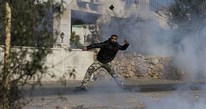
The Israeli police forces stormed Sunday afternoon Issawiya town east of occupied Jerusalem which led to the outbreak of violent clashes.
According to Quds Media, clashes broke out in the town after dozens of Israeli policemen brutally stormed it and deployed in large numbers throughout its neighborhoods amid random fire of teargas bombs.
Israeli snipers also climbed over the rooftops of local homes, the sources added. In their turn, Palestinian youths responded by throwing stones and Molotov cocktails at the police forces.
Meanwhile, Israeli authorities released a detained young man with special needs shortly after his arrest near Issawiya town.
Two other brothers were detained after being summoned for investigation at Qalandia checkpoint north of the occupied city, Qalandia media center said.
Six more arrests were reported at dawn Sunday across the West Bank, while a 19-year-old youngster was arrested in occupied Jerusalem.
According to Quds Media, clashes broke out in the town after dozens of Israeli policemen brutally stormed it and deployed in large numbers throughout its neighborhoods amid random fire of teargas bombs.
Israeli snipers also climbed over the rooftops of local homes, the sources added. In their turn, Palestinian youths responded by throwing stones and Molotov cocktails at the police forces.
Meanwhile, Israeli authorities released a detained young man with special needs shortly after his arrest near Issawiya town.
Two other brothers were detained after being summoned for investigation at Qalandia checkpoint north of the occupied city, Qalandia media center said.
Six more arrests were reported at dawn Sunday across the West Bank, while a 19-year-old youngster was arrested in occupied Jerusalem.
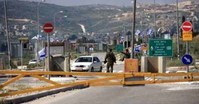
Israeli soldiers on Saturday evening stole a sum of money from a Palestinian civilian at a military makeshift checkpoint located southwest of Jenin city.
According to WAFA news agency, soldiers intercepted Rami Abu Ghalyoun, a resident of al-Bireh city, at a roadblock near the intersection of Arraba town and stole 1,800 shekels from him.
Abu Ghalyoun lodged an official complaint about the incident with the Palestinian Authority security liaison office after he arrived in Jenin.
In a separate incident, the Israeli occupation forces (IOF) kidnapped on the same day a Palestinian young man at the entrance to Yabad town, also south of Jenin.
His identity is still unknown. IOF soldiers also set up a roadblock at the entrance to Yabad town and clashed with local young men. Local sources said that several young men suffered from inhaling tear gas during the clashes with the invading troops.
According to WAFA news agency, soldiers intercepted Rami Abu Ghalyoun, a resident of al-Bireh city, at a roadblock near the intersection of Arraba town and stole 1,800 shekels from him.
Abu Ghalyoun lodged an official complaint about the incident with the Palestinian Authority security liaison office after he arrived in Jenin.
In a separate incident, the Israeli occupation forces (IOF) kidnapped on the same day a Palestinian young man at the entrance to Yabad town, also south of Jenin.
His identity is still unknown. IOF soldiers also set up a roadblock at the entrance to Yabad town and clashed with local young men. Local sources said that several young men suffered from inhaling tear gas during the clashes with the invading troops.
2 apr 2016
|
|
Israeli forces shot a Palestinian teen in the back of the head with a rubber-coated steel bullet while he was walking to school in the Silwan neighborhood of occupied East Jerusalem on Saturday morning, his family told Ma’an.
Yasin Abu Mayyala said his son Hatim, 13, was taken from the Ras al-Amoud area in Silwan, where he was shot, to Hadassah Hospital in the West Jerusalem neighborhood of Ein Kerem, where medics said he suffered from a deep wound that needed recquired stitches. The boy was suffering from nausea and vomiting, Abu Mayyala said. Abu Mayyala told Ma’an that Hatim left home with his brother Ahmed and as they stepped out of the bus, each went in a different direction as a result of clashes in the area between Palestinians and Israeli forces. |
“While Hatim was looking for Ahmed, Israeli forces fired a rubber-coated bullet at his head causing severe bleeding and a deep wound,” he added.
Hatim told his father that despite his wounds, he was attacked and beaten violently by six Israeli officers before they detained him. An ambulance later arrived and evacuated him.
Abu Mayyala said that his son’s school notified him that Hatim was detained.
When he arrived he saw an ambulance, and Israeli forces told him his son had been hit.
Israeli forces reportedly decided to halt the detention process on the condition that his family bring Hatim to an Israeli interrogation center for questioning after he leaves the hospital, according to his father.
An Israeli border police spokesperson could not be immediately reached for comment.
Israeli forces often clash with Palestinian youths commuting to school in the Silwan neighborhood, which is near the heavily guarded Old City of occupied East Jerusalem.
Parents have reported that the presence of Israeli forces stationed in the neighborhood causes psychological trauma to their children. Parents are also fearful of their children being shot or injured.
In a report published in March, Defense for Children International-Palestine (DCIP) said it had documented at least eight cases where children had received serious injuries in their upper bodies due to Israeli forces' "misuse" of the weapons since a wave of unrest erupted last October.
According to the report, Israeli military regulations say that Israeli forces may only fire rubber-coated steel bullets at the legs, and never at women or children.
"While Israeli military regulations restrict the parameters and manner of their use, the excessive and improper use of crowd control weapons can lead to permanent disability or even death, particularly in children."
According to rights group B’Tselem, rubber-coated metal bullets have been prohibited within Israel’s borders since the 2000 Orr Commission, when Israeli police began using 40mm-caliber sponge rounds as a crowd control method in East Jerusalem.
DCIP cited UN figures, which say that between October and January, Israeli forces injured at least 2,177 Palestinian children in the occupied West Bank and East Jerusalem.
UN rights monitor to the occupied Palestinian territory Makarim Wibisono recently condemned excessive use of force used by Israeli military forces and urged the Israeli authorities to comply with international law regarding the use of force and firearms.
Hatim told his father that despite his wounds, he was attacked and beaten violently by six Israeli officers before they detained him. An ambulance later arrived and evacuated him.
Abu Mayyala said that his son’s school notified him that Hatim was detained.
When he arrived he saw an ambulance, and Israeli forces told him his son had been hit.
Israeli forces reportedly decided to halt the detention process on the condition that his family bring Hatim to an Israeli interrogation center for questioning after he leaves the hospital, according to his father.
An Israeli border police spokesperson could not be immediately reached for comment.
Israeli forces often clash with Palestinian youths commuting to school in the Silwan neighborhood, which is near the heavily guarded Old City of occupied East Jerusalem.
Parents have reported that the presence of Israeli forces stationed in the neighborhood causes psychological trauma to their children. Parents are also fearful of their children being shot or injured.
In a report published in March, Defense for Children International-Palestine (DCIP) said it had documented at least eight cases where children had received serious injuries in their upper bodies due to Israeli forces' "misuse" of the weapons since a wave of unrest erupted last October.
According to the report, Israeli military regulations say that Israeli forces may only fire rubber-coated steel bullets at the legs, and never at women or children.
"While Israeli military regulations restrict the parameters and manner of their use, the excessive and improper use of crowd control weapons can lead to permanent disability or even death, particularly in children."
According to rights group B’Tselem, rubber-coated metal bullets have been prohibited within Israel’s borders since the 2000 Orr Commission, when Israeli police began using 40mm-caliber sponge rounds as a crowd control method in East Jerusalem.
DCIP cited UN figures, which say that between October and January, Israeli forces injured at least 2,177 Palestinian children in the occupied West Bank and East Jerusalem.
UN rights monitor to the occupied Palestinian territory Makarim Wibisono recently condemned excessive use of force used by Israeli military forces and urged the Israeli authorities to comply with international law regarding the use of force and firearms.
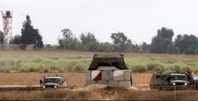
Two Palestinians were injured at dawn Saturday after Israeli Occupation Forces (IOF) opened fire at Palestinian border areas in Rafah south of the Gaza Strip.
Local sources said that Israeli forces stationed at watchtowers east of Rafah opened their machinegun fire at two Palestinian youths while passing near the destroyed Gaza international airport.
Ambulance crews took time to reach the area before transferring the two injured to hospital for treatment as they suffered slight wounds in their feet.
Meanwhile, Israeli navy forces opened fire at a Palestinian fishing boat off Rafah shores. Palestinian sources affirmed that the fishing boat capsized after being directly targeted by Israeli war boats. The fishermen on board jumped into the water and swam back to shore.
The two attacks came as part of the Israeli almost daily violations to the ceasefire agreement signed on Aug. 26, 2014 with Palestinian resistance under Egyptian mediation.
Local sources said that Israeli forces stationed at watchtowers east of Rafah opened their machinegun fire at two Palestinian youths while passing near the destroyed Gaza international airport.
Ambulance crews took time to reach the area before transferring the two injured to hospital for treatment as they suffered slight wounds in their feet.
Meanwhile, Israeli navy forces opened fire at a Palestinian fishing boat off Rafah shores. Palestinian sources affirmed that the fishing boat capsized after being directly targeted by Israeli war boats. The fishermen on board jumped into the water and swam back to shore.
The two attacks came as part of the Israeli almost daily violations to the ceasefire agreement signed on Aug. 26, 2014 with Palestinian resistance under Egyptian mediation.
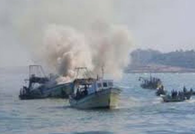
Israeli navy boats fired, on Saturday at dawn, several shells and live rounds on a number of Palestinian fishing boats, near the Rafah shore, in the southern part of the Gaza Strip, causing one boat to sink. Two Palestinians injured on Friday at night.
Eyewitnesses said the navy ships fired several shells at the fishing boats, close to the shore in Rafah, directly hitting one boat, causing it to catch on fire and sink.
There have been no reports of casualties in the attack as of this report.
The Israeli navy frequently targets fishing boats in Gaza territorial waters, and even while on shore, an issue that led to dozens of causalities, including several fatalities, and many arrests in addition to the confiscation of boats, the only sources of livelihood to dozens of thousands of Palestinian families in the besieged coastal enclave.
On Friday at night, the soldiers shot and injured two young Palestinian men, ages 26 and 24, in Palestinian agricultural lands, near the border fence, east of Rafah.
,
The two were shot with live rounds in their legs, and were moved to Abu Yousef Najjar Hospital suffering mild injuries.
Eyewitnesses said the navy ships fired several shells at the fishing boats, close to the shore in Rafah, directly hitting one boat, causing it to catch on fire and sink.
There have been no reports of casualties in the attack as of this report.
The Israeli navy frequently targets fishing boats in Gaza territorial waters, and even while on shore, an issue that led to dozens of causalities, including several fatalities, and many arrests in addition to the confiscation of boats, the only sources of livelihood to dozens of thousands of Palestinian families in the besieged coastal enclave.
On Friday at night, the soldiers shot and injured two young Palestinian men, ages 26 and 24, in Palestinian agricultural lands, near the border fence, east of Rafah.
,
The two were shot with live rounds in their legs, and were moved to Abu Yousef Najjar Hospital suffering mild injuries.
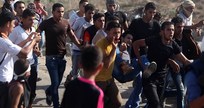
A Palestinian young man suffered gunshot injuries while dozens others choked on teargas after Israeli Occupation Forces (IOF) attacked peaceful protesters near the eastern border areas on Friday evening.
Local sources said that the young man was transferred to hospital in moderate condition after he was shot in his foot near the border fence.
Dozens of teargas suffocation cases were also reported among the protesters.
Since the outbreak of Jerusalem Intifada, the eastern border areas of Gaza Strip have seen weekly clashes between local protesters and Israeli forces stationed at the border fence.
Local sources said that the young man was transferred to hospital in moderate condition after he was shot in his foot near the border fence.
Dozens of teargas suffocation cases were also reported among the protesters.
Since the outbreak of Jerusalem Intifada, the eastern border areas of Gaza Strip have seen weekly clashes between local protesters and Israeli forces stationed at the border fence.
1 apr 2016
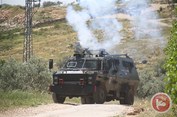
Dozens of Palestinians, international supporters, and Palestinian children suffered tear-gas inhalation on Friday as Israeli forces suppressed weekly marches in Bilin and Kafr Qaddum.
Local sources in the central occupied West Bank village of Bilin told Ma’an that Israeli soldiers fired rubber-coated steel bullets, gas canisters, and stun grenades at protesters. Children suffered from tear gas inhalation despite being inside their home, located nearby where the demonstration took place, locals said.
Israeli forces’ violent crowd dispersal methods set fire to areas of land planted with olive trees, almonds, and beans belonging to Bilin local Mahmoud Abd al-Hadi Samara, sources said.
The march was called for by a local popular resistance committee of Bilin.
Protesters waved Palestinian flags and marched across the village calling for national unity, holding on to Palestinian rights, resisting the Israeli military occupation, and releasing political prisoners.
In the village of Kafr Qaddum the northern West Bank district of Qalqiliya, dozens of Palestinians suffered tear-gas inhalation as Israeli forces suppressed the the weekly protest calling for the reopening of the village's main road, which has been closed for 13 years.
The spokesman for the Popular Resistance in Qalqiliya, Murad Shtewei, said that the march was called for by the Fatah movement commemorating the 40th Land Day.
Shtewei added that Israeli forces of different units fired gas canisters and stun grenades causing dozens to suffer severe tear-gas inhalation.
Clashes erupted between Israeli forces and Palestinian youths, with youths throwing rocks and empty bottles at soldiers.
Residents of Kafr Qaddum stage regular protests against land confiscations as well as the closure of the village's southern road by Israeli forces. The road is the main route to the nearby city of Nablus, the nearest economic center.
Bilin has long been one of the most active villages in organized opposition against Israeli policies, this year marking the eleventh consecutive year of weekly marches against expanding nearby settlements and the separation wall which separates residents from their private land.
The protests come after thousands of Palestinians across Israel and the occupied Palestinian territory marched Wednesday to commemorate the 40th Land Day, protesting decades of Israeli land grabs.
Many villages in the occupied West Bank and Jerusalem participate in weekly Friday protests, including Kafr Qaddum, Bilin, Nabi Saleh, Nillin, and al-Masara.
Israeli forces have come under repeated criticism for excessive use force as well as lethal methods of crowd control that often result in death or injury of protesters.
Dozens of Palestinians injured during West Bank marches
Dozens of Palestinians were injured after Israeli Occupation Forces (IOF) suppressed on Friday West Bank weekly marches.
The PIC reporter said that Israeli forces violently attacked the anti-occupation march of Nabi Saleh that came in commemoration of the 40th anniversary of the Land Day.
Israeli forces also attacked Jordanian journalists and prevented them from covering the events.
Dozens of local residents and foreign activists had participated in the march. Meanwhile, teargas suffocation cases were reported as Israeli forces suppressed Bil’in weekly march west of Ramallah. Participants waved during the march Palestinian flags and chanted slogans in support of national unity and Palestinian constants.
Banners calling for prisoners’ release and activating resistance option were also raised. Teargas bombs and rubber bullets were fired at the participants once they reached the separation wall, injuring dozens of them.
Several nearby olive and almond trees were burned due to the heavy firing of teargas bombs. In Qalqilia, several locals suffered effects of teargas inhalation when Israeli forces suppressed Kafer Qaddum anti-settlement march.
Israeli forces deployed since the morning hours in the area and closed the main road in village before attacking the participants with teargas bombs. In Qabatia, clashes broke out after Israeli forces stormed the town Friday evening amid heavy firing of teargas bombs. Several injuries were reported.
Local sources told the PIC reporter that Israeli forces stormed the town and filmed a home belonging to Ahmed Abu Rab who was earlier killed by Israeli gunfire. The house was threatened with demolition as part of Israeli collective punishment policy against Palestinians suspected of carrying out anti-occupation attacks.
In occupied Jerusalem, a protest vigil was organized Friday afternoon in Silwan town in protest against Israeli decision to demolish 50 local homes starting from April. The protesters declared their total rejection of Israel’s racist practices and displacement policy against Jerusalemites.
In Jenin, Israeli forces stormed Yabad town south of the city and erected a military checkpoint at its main entrance. Several vehicles were stopped and searched at the checkpoint, while a local home was stormed during the raid.
Local sources in the central occupied West Bank village of Bilin told Ma’an that Israeli soldiers fired rubber-coated steel bullets, gas canisters, and stun grenades at protesters. Children suffered from tear gas inhalation despite being inside their home, located nearby where the demonstration took place, locals said.
Israeli forces’ violent crowd dispersal methods set fire to areas of land planted with olive trees, almonds, and beans belonging to Bilin local Mahmoud Abd al-Hadi Samara, sources said.
The march was called for by a local popular resistance committee of Bilin.
Protesters waved Palestinian flags and marched across the village calling for national unity, holding on to Palestinian rights, resisting the Israeli military occupation, and releasing political prisoners.
In the village of Kafr Qaddum the northern West Bank district of Qalqiliya, dozens of Palestinians suffered tear-gas inhalation as Israeli forces suppressed the the weekly protest calling for the reopening of the village's main road, which has been closed for 13 years.
The spokesman for the Popular Resistance in Qalqiliya, Murad Shtewei, said that the march was called for by the Fatah movement commemorating the 40th Land Day.
Shtewei added that Israeli forces of different units fired gas canisters and stun grenades causing dozens to suffer severe tear-gas inhalation.
Clashes erupted between Israeli forces and Palestinian youths, with youths throwing rocks and empty bottles at soldiers.
Residents of Kafr Qaddum stage regular protests against land confiscations as well as the closure of the village's southern road by Israeli forces. The road is the main route to the nearby city of Nablus, the nearest economic center.
Bilin has long been one of the most active villages in organized opposition against Israeli policies, this year marking the eleventh consecutive year of weekly marches against expanding nearby settlements and the separation wall which separates residents from their private land.
The protests come after thousands of Palestinians across Israel and the occupied Palestinian territory marched Wednesday to commemorate the 40th Land Day, protesting decades of Israeli land grabs.
Many villages in the occupied West Bank and Jerusalem participate in weekly Friday protests, including Kafr Qaddum, Bilin, Nabi Saleh, Nillin, and al-Masara.
Israeli forces have come under repeated criticism for excessive use force as well as lethal methods of crowd control that often result in death or injury of protesters.
Dozens of Palestinians injured during West Bank marches
Dozens of Palestinians were injured after Israeli Occupation Forces (IOF) suppressed on Friday West Bank weekly marches.
The PIC reporter said that Israeli forces violently attacked the anti-occupation march of Nabi Saleh that came in commemoration of the 40th anniversary of the Land Day.
Israeli forces also attacked Jordanian journalists and prevented them from covering the events.
Dozens of local residents and foreign activists had participated in the march. Meanwhile, teargas suffocation cases were reported as Israeli forces suppressed Bil’in weekly march west of Ramallah. Participants waved during the march Palestinian flags and chanted slogans in support of national unity and Palestinian constants.
Banners calling for prisoners’ release and activating resistance option were also raised. Teargas bombs and rubber bullets were fired at the participants once they reached the separation wall, injuring dozens of them.
Several nearby olive and almond trees were burned due to the heavy firing of teargas bombs. In Qalqilia, several locals suffered effects of teargas inhalation when Israeli forces suppressed Kafer Qaddum anti-settlement march.
Israeli forces deployed since the morning hours in the area and closed the main road in village before attacking the participants with teargas bombs. In Qabatia, clashes broke out after Israeli forces stormed the town Friday evening amid heavy firing of teargas bombs. Several injuries were reported.
Local sources told the PIC reporter that Israeli forces stormed the town and filmed a home belonging to Ahmed Abu Rab who was earlier killed by Israeli gunfire. The house was threatened with demolition as part of Israeli collective punishment policy against Palestinians suspected of carrying out anti-occupation attacks.
In occupied Jerusalem, a protest vigil was organized Friday afternoon in Silwan town in protest against Israeli decision to demolish 50 local homes starting from April. The protesters declared their total rejection of Israel’s racist practices and displacement policy against Jerusalemites.
In Jenin, Israeli forces stormed Yabad town south of the city and erected a military checkpoint at its main entrance. Several vehicles were stopped and searched at the checkpoint, while a local home was stormed during the raid.
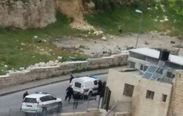
Palestinian medical sources in Jerusalem have reported, on Thursday evening, that Israeli soldiers shot and injured an elderly Palestinian woman, while sitting in front of her home in Ein al-Louza neighborhood in Silwan town, in occupied Jerusalem.
The sources said that the woman, 63 years of age, was shot with a rubber-coated steel bullet in her back, while sitting in front of her home.
Eyewitnesses said the soldiers invaded the neighborhood, and clashed with dozens of youngsters, who hurled stones on them; the soldiers fired many gas bombs, concussion grenades, rubber-coated steel bullets and several flares.
In addition, the soldiers invaded a school in Ras al-‘Amoud in Silwan, and searched several homes.
In related news, the soldiers forced Ahmad Nasser Rokin, 19, from Jerusalem, out of the city for four months under the “emergency law” and gave him two hours to leave the occupied city.
The sources said that the woman, 63 years of age, was shot with a rubber-coated steel bullet in her back, while sitting in front of her home.
Eyewitnesses said the soldiers invaded the neighborhood, and clashed with dozens of youngsters, who hurled stones on them; the soldiers fired many gas bombs, concussion grenades, rubber-coated steel bullets and several flares.
In addition, the soldiers invaded a school in Ras al-‘Amoud in Silwan, and searched several homes.
In related news, the soldiers forced Ahmad Nasser Rokin, 19, from Jerusalem, out of the city for four months under the “emergency law” and gave him two hours to leave the occupied city.
31 mar 2016
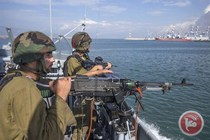
Israeli navy boats opened fire on Palestinian fishermen off the coast of the northern Gaza Strip early on Thursday.
Witnesses told Ma'an that Israeli war boats deployed off the coast of al-Sudaniyya in the besieged Palestinian enclave opened fire at fishing boats, forcing fishermen to head back to shore.
No injuries were reported.
An Israeli army spokesperson said Israeli forces fired "warning shots" into the air after a boat strayed from the "designated fishing zone" off the coast of the northern Gaza Strip.
As part of Israel's blockade of the coastal enclave, Gaza fishermen are required to work within a limited "designated fishing zone" of six nautical miles off the coast.
However, the Palestinian Center for Human Rights says that Israeli naval forces often open fire on fishermen within these limits.
On Wednesday, Gaza’s fishing union said Israel was planning to expand the fishing zone to nine nautical miles in the southern Gaza Strip. Israeli authorities have yet to confirm the information.
Due to the high frequency of the attacks, live fire on fishing boats often goes unreported.
Last year Israeli naval forces opened fire on Palestinian fishermen at least 139 times, wounding 24 and damaging 16 fishing boats, the center said.
Witnesses told Ma'an that Israeli war boats deployed off the coast of al-Sudaniyya in the besieged Palestinian enclave opened fire at fishing boats, forcing fishermen to head back to shore.
No injuries were reported.
An Israeli army spokesperson said Israeli forces fired "warning shots" into the air after a boat strayed from the "designated fishing zone" off the coast of the northern Gaza Strip.
As part of Israel's blockade of the coastal enclave, Gaza fishermen are required to work within a limited "designated fishing zone" of six nautical miles off the coast.
However, the Palestinian Center for Human Rights says that Israeli naval forces often open fire on fishermen within these limits.
On Wednesday, Gaza’s fishing union said Israel was planning to expand the fishing zone to nine nautical miles in the southern Gaza Strip. Israeli authorities have yet to confirm the information.
Due to the high frequency of the attacks, live fire on fishing boats often goes unreported.
Last year Israeli naval forces opened fire on Palestinian fishermen at least 139 times, wounding 24 and damaging 16 fishing boats, the center said.
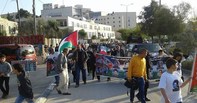
The Israeli Occupation Forces (IOF) suppressed on Wednesday evening a peaceful march in Doheisheh refugee camp, south of Bethlehem, in commemoration of the Land Day.
The PIC reporter said that the march started from Doheisheh camp heading towards the northern entrance of Bethlehem.
The participants waved Palestinian flags and raised photos of Palestinian martyrs whose bodies are still detained by Israeli authorities, some of whom, for dozens of years.
Israeli forces attacked the peaceful march with teargas bombs. Dozens of participants choked on tear gas. Palestinian youths responded by throwing stones at the soldiers.
Meanwhile, dozens of Palestinian refugees marked on Wednesday the Land Day in Yarmouk refugee camp in Syria despite the tight siege imposed on the camp.
The commemoration event came in coincidence with the arrival of a Swedish aid convoy to the besieged camp. Hundreds of food parcels were distributed in Yarmouk camp. Coordinator for the aid convoy Khaled Youssef revealed that a second convoy will be organized before the holy month of Ramadan.
The PIC reporter said that the march started from Doheisheh camp heading towards the northern entrance of Bethlehem.
The participants waved Palestinian flags and raised photos of Palestinian martyrs whose bodies are still detained by Israeli authorities, some of whom, for dozens of years.
Israeli forces attacked the peaceful march with teargas bombs. Dozens of participants choked on tear gas. Palestinian youths responded by throwing stones at the soldiers.
Meanwhile, dozens of Palestinian refugees marked on Wednesday the Land Day in Yarmouk refugee camp in Syria despite the tight siege imposed on the camp.
The commemoration event came in coincidence with the arrival of a Swedish aid convoy to the besieged camp. Hundreds of food parcels were distributed in Yarmouk camp. Coordinator for the aid convoy Khaled Youssef revealed that a second convoy will be organized before the holy month of Ramadan.
30 mar 2016
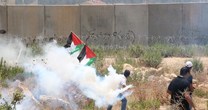
Dozens of Palestinians suffered different injuries Wednesday afternoon after Israeli Occupation Forces (IOF) suppressed Land Day marches in Nablus north of occupied West Bank.
Local institutions and national forces organized on Wednesday an event in the evacuated Homesh settlement in Nablus marking the Palestinian Land Day.
Head of the village council of Burqa, Sami Douglas, told the PIC reporter that Israeli forces were deployed at the entrance of the evacuated settlement and the entrances of the nearby villages and prevented locals from participating in the event amid heavy fire of teargas bombs.
A number of participants were detained for few hours before being released, while others suffered effects of teargas inhalation. Large land tracts of Burqa town were previously confiscated and turned into Homesh settlement before an Israeli court ordered its evacuation in 2005.
However, Israeli forces continue to prevent Palestinians from entering the evacuated settlement while allowing setters in. Meanwhile, IOF soldiers suppressed Wednesday a Palestinian march near Ofer prison southwest of Ramallah marking the 40th anniversary of the Land Day.
Israeli border guards were deployed in large numbers in the area and heavily fired teargas bombs at the peaceful protesters. During the march, protesters held banners and chanted slogans stressing their adherence to each inch of Palestinian land and to the right of return.
Local institutions and national forces organized on Wednesday an event in the evacuated Homesh settlement in Nablus marking the Palestinian Land Day.
Head of the village council of Burqa, Sami Douglas, told the PIC reporter that Israeli forces were deployed at the entrance of the evacuated settlement and the entrances of the nearby villages and prevented locals from participating in the event amid heavy fire of teargas bombs.
A number of participants were detained for few hours before being released, while others suffered effects of teargas inhalation. Large land tracts of Burqa town were previously confiscated and turned into Homesh settlement before an Israeli court ordered its evacuation in 2005.
However, Israeli forces continue to prevent Palestinians from entering the evacuated settlement while allowing setters in. Meanwhile, IOF soldiers suppressed Wednesday a Palestinian march near Ofer prison southwest of Ramallah marking the 40th anniversary of the Land Day.
Israeli border guards were deployed in large numbers in the area and heavily fired teargas bombs at the peaceful protesters. During the march, protesters held banners and chanted slogans stressing their adherence to each inch of Palestinian land and to the right of return.
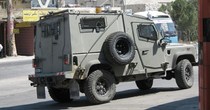
An Israeli soldier in a speeding military jeep deliberately ran over a Palestinian child in a hamlet to the east of Yatta town in al-Khalil province at noon Wednesday.
Eyewitnesses said that the child was 14 years old and was transferred to hospital where doctors described his condition as “moderate”.
Similar incidents by Israeli settlers and soldiers were recently monitored but none was investigated. The Israeli occupation authorities consider such incidents as road accidents.
Hebron: Military Jeep Runs Over Palestinian Boy on Motorbike
A Palestinian minor, on Wednesday, sustained fractures and injuries after an Israeli military jeep ran him over near an area of Yatta town, in the southern West Bank district of Hebron, according to a local activist.
Coordinator of the popular committees against the wall and settlements in southern Hebron, Rateb al-Jabour, informed WAFA that 14-year-old No’man Basal, who was riding a motorbike at the time of the incident, was run over by a military jeep as he attempted to cross a public road in the area.
The minor sustained injuries and a fracture in his leg, which necessitated his transfer to hospital for medical treatment.
Eyewitnesses said that the child was 14 years old and was transferred to hospital where doctors described his condition as “moderate”.
Similar incidents by Israeli settlers and soldiers were recently monitored but none was investigated. The Israeli occupation authorities consider such incidents as road accidents.
Hebron: Military Jeep Runs Over Palestinian Boy on Motorbike
A Palestinian minor, on Wednesday, sustained fractures and injuries after an Israeli military jeep ran him over near an area of Yatta town, in the southern West Bank district of Hebron, according to a local activist.
Coordinator of the popular committees against the wall and settlements in southern Hebron, Rateb al-Jabour, informed WAFA that 14-year-old No’man Basal, who was riding a motorbike at the time of the incident, was run over by a military jeep as he attempted to cross a public road in the area.
The minor sustained injuries and a fracture in his leg, which necessitated his transfer to hospital for medical treatment.
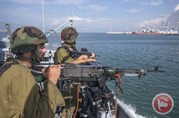
Israeli naval forces fired shells at Palestinian fishermen off the coast of the northern Gaza Strip on Wednesday morning, locals said, with no injuries reported.
Witnesses told Ma'an the shells landed near the shore, without providing any further details.
An Israeli army spokesperson said she was looking into the reports.
As part of Israel's blockade of the coastal enclave, Gazan fishermen are required to work within a limited "designated fishing zone" of six nautical miles off the coast.
However, the Palestinian Center for Human Rights says that Israeli naval forces often open fire on fishermen within these limits.
Due to the high frequency of the attacks, live fire on fishing boats often goes unreported.
Last year Israeli naval forces opened fire on Palestinian fishermen at least 139 times, wounding 24 and damaging 16 fishing boats, the center said.
Witnesses told Ma'an the shells landed near the shore, without providing any further details.
An Israeli army spokesperson said she was looking into the reports.
As part of Israel's blockade of the coastal enclave, Gazan fishermen are required to work within a limited "designated fishing zone" of six nautical miles off the coast.
However, the Palestinian Center for Human Rights says that Israeli naval forces often open fire on fishermen within these limits.
Due to the high frequency of the attacks, live fire on fishing boats often goes unreported.
Last year Israeli naval forces opened fire on Palestinian fishermen at least 139 times, wounding 24 and damaging 16 fishing boats, the center said.
29 mar 2016
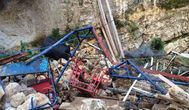
Dozens of Israeli soldiers and police officers, accompanied with personnel of the Jerusalem City Council and the Israel Antiquities Authority, invaded on Tuesday morning the town of Silwan, in occupied Jerusalem, and demolished a playground, a room and several walls.
The Wadi Hilweh Information Center in Silwan (Silwanic) said the soldiers invaded the al-'Abbasiyya neighborhood in the town, and surrounded a land owned by Khaled az-Zeer, before demolishing a recently constructed playground for children, including swings and slides.
Az-Zeer built the recreational area for children, and their families, several months ago, and said he never received any warnings or notices from the City Council.
"They just drove in, and demolished everything," he told Silwanic, "they also bulldozed the grounds, cut and uprooted trees, demolished walls, and demolished a 12 square/meter storage room."
He told Silwanic that the soldiers forcibly removed him from his property, and assaulted one of his relatives, identified as Jihad az-Zeer.
The soldiers also removed a fence, surrounding his property, and illegally confiscated 14 Dunams of his lands to use them as part of the “National Gardens” project.
In addition, resident Mohammad Samrein said the soldiers surrounded his home in the al-'Abbasiyya neighborhood in Silwan, and bulldozed a farmland without any prior notice or warning.
Samrein said his family transformed the land from a garbage dumpster into a fertile agricultural area, and added that the soldiers also forced him to remove a stable for horses.
Silwanic said the soldiers assaulted a child, identified as Adam Samrein, only 12 years of age, causing various cuts and bruises.
The Wadi Hilweh Information Center in Silwan (Silwanic) said the soldiers invaded the al-'Abbasiyya neighborhood in the town, and surrounded a land owned by Khaled az-Zeer, before demolishing a recently constructed playground for children, including swings and slides.
Az-Zeer built the recreational area for children, and their families, several months ago, and said he never received any warnings or notices from the City Council.
"They just drove in, and demolished everything," he told Silwanic, "they also bulldozed the grounds, cut and uprooted trees, demolished walls, and demolished a 12 square/meter storage room."
He told Silwanic that the soldiers forcibly removed him from his property, and assaulted one of his relatives, identified as Jihad az-Zeer.
The soldiers also removed a fence, surrounding his property, and illegally confiscated 14 Dunams of his lands to use them as part of the “National Gardens” project.
In addition, resident Mohammad Samrein said the soldiers surrounded his home in the al-'Abbasiyya neighborhood in Silwan, and bulldozed a farmland without any prior notice or warning.
Samrein said his family transformed the land from a garbage dumpster into a fertile agricultural area, and added that the soldiers also forced him to remove a stable for horses.
Silwanic said the soldiers assaulted a child, identified as Adam Samrein, only 12 years of age, causing various cuts and bruises.
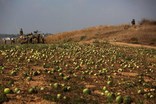
Israeli forces on Tuesday opened fire on Palestinian farmers and fishermen working in the beleaguered Gaza Strip, locals said.
Witnesses told Ma’an that Israeli soldiers stationed in watchtowers along the borderline in the southern Gaza Strip fired heavily towards Palestinian agricultural land, forcing farmers to leave the area.
Israeli naval forces meanwhile opened fire at Palestinian fishing boats off the coast of the northern Gaza Strip.
No casualties were reported in either incident.
Locals added that a number of Israeli military vehicles crossed the border fence between Israel and the central Gaza Strip near al-Bureij refugee camp. Witnesses said Israeli helicopters hovered over the area during the incursion, adding that a large drilling excavator was seen in the area.
An Israeli army spokesperson told Ma’an they were looking into the reports.
Palestinian farmers and fishermen face frequent fire from Israeli forces inside of or near the military-imposed “buffer zone” on both land and sea. While the exact limits of the zone are often unclear, they are enforced with live fire.
The Israeli army often says in such circumstances that the use of live fire is necessary to deter potential "security threats,” a policy that has in effect destroyed much of the agricultural and fishing sectors of the impoverished Palestinian territory, which has been under a crippling Israeli blockade since 2007.
The UN Office for the Coordination of Humanitarian Affairs last month reported at least 42 cases of Israeli forces opening fire on Palestinians in the buffer zone, on both land and sea sides.
Witnesses told Ma’an that Israeli soldiers stationed in watchtowers along the borderline in the southern Gaza Strip fired heavily towards Palestinian agricultural land, forcing farmers to leave the area.
Israeli naval forces meanwhile opened fire at Palestinian fishing boats off the coast of the northern Gaza Strip.
No casualties were reported in either incident.
Locals added that a number of Israeli military vehicles crossed the border fence between Israel and the central Gaza Strip near al-Bureij refugee camp. Witnesses said Israeli helicopters hovered over the area during the incursion, adding that a large drilling excavator was seen in the area.
An Israeli army spokesperson told Ma’an they were looking into the reports.
Palestinian farmers and fishermen face frequent fire from Israeli forces inside of or near the military-imposed “buffer zone” on both land and sea. While the exact limits of the zone are often unclear, they are enforced with live fire.
The Israeli army often says in such circumstances that the use of live fire is necessary to deter potential "security threats,” a policy that has in effect destroyed much of the agricultural and fishing sectors of the impoverished Palestinian territory, which has been under a crippling Israeli blockade since 2007.
The UN Office for the Coordination of Humanitarian Affairs last month reported at least 42 cases of Israeli forces opening fire on Palestinians in the buffer zone, on both land and sea sides.
